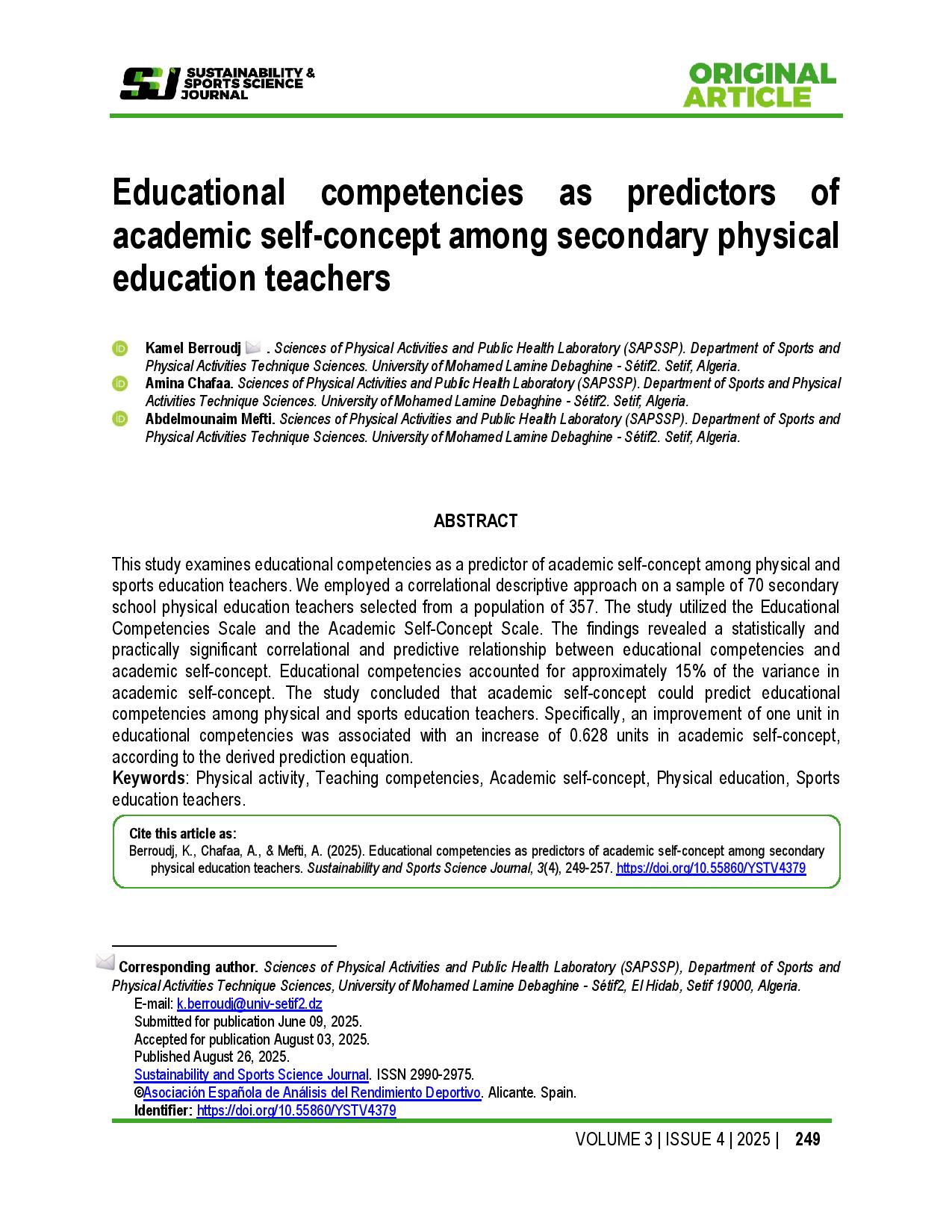Educational competencies as predictors of academic self-concept among secondary physical education teachers
Main Article Content
Abstract
This study examines educational competencies as a predictor of academic self-concept among physical and sports education teachers. We employed a correlational descriptive approach on a sample of 70 secondary school physical education teachers selected from a population of 357. The study utilized the Educational Competencies Scale and the Academic Self-Concept Scale. The findings revealed a statistically and practically significant correlational and predictive relationship between educational competencies and academic self-concept. Educational competencies accounted for approximately 15% of the variance in academic self-concept. The study concluded that academic self-concept could predict educational competencies among physical and sports education teachers. Specifically, an improvement of one unit in educational competencies was associated with an increase of 0.628 units in academic self-concept, according to the derived prediction equation.
Article Details

This work is licensed under a Creative Commons Attribution-NonCommercial-ShareAlike 4.0 International License.
References
Ahmed Khan, E., Akbar, M., Zeeshan, M., Ijaz, A., Raza, H., Batool, A., & Saeed, S. (2024). The Unpacked Influence of Personality Traits on Personal and Academic Attributes Among Students. Social Science Review Archives 2(2). https://doi.org/10.70670/sra.v2i2.225
Aouani, H., & Amara, S. (2024). Self-esteem: A Systematic Comparison between Teachers and Trainees in Physical Education and Sports. Advances in Social Sciences Research Journal, 11(2), 441-448. https://doi.org/10.14738/assrj.112.16512
Arif Subekti, M., Ahmad, M., Negeri Jakarta Jl Rawamangun Muka Raya No, U., & Pulo Gadung, K. (2024). Transforming Teacher Performance: The Impact of Training and Professional Development on Competence Improvement.
Arineitwe, P., Kasule, G. W., & Mayengo, N. (2024). Institutional Support and Teacher Competence in Government-Aided Secondary Schools in South Western Uganda. East African Journal of Education Studies, 7(4), 793-806. https://doi.org/10.37284/eajes.7.4.2487
Aydın, Erkan. (2024). The Effect of Turkish Teacher Candidates' Personality Traits on Academic Self-efficacy and Effective Communication Self-efficacy. SAGE Open, 14(4), 21582440241305050. https://doi.org/10.1177/21582440241305046
Camacho Carranza, Á., & Almagro, B. J. (2024). Factores motivacionales, autoestima e intención de ser físicamente activo en el alumnado de formación profesional de modalidad deportiva. E-Balonmano Com Journal Sports Science, 20(3), 331-342. https://doi.org/10.17398/1885-7019.20.331
Coppola, S., Cristiana, D., Minghelli, V., & Vastola, R. (2024). Ecological dynamics approach in physical education to promote cognitive skills development: A review. In Journal of Human Sport and Exercise (Vol. 19, Issue 3, pp. 792-802). https://doi.org/10.55860/k7ynwe36
Dhungana, P. (2024). Education Is a Competency to Produce: A Competency Theory of Education. Educational Practice and Theory, 46(2), 57-67. https://doi.org/10.7459/ept/460205
Eka Mayasari, & Syarif, M. (2024). Pendidikan (Peningkatan Kompetensi) Guru. Jurnal Ilmu Pendidikan, 3(1), 5-12. https://doi.org/10.58222/jurip.v3i1.260
Folabit, N. L., & Jita, L. C. (2024). Academics' professional identity: Conflicting personal values of academics and institutional culture. Interdisciplinary Journal of Sociality Studies, 4, 1-13. https://doi.org/10.38140/ijss-2024.vol4.05
Granada, G. D., & Oco, R. M. (2024). Classroom Management and Teaching Competencies of Elementary Teachers. International Journal of Multidisciplinary Research and Analysis, 3(3), 1276-1283. https://doi.org/10.47191/ijmra/v7-i03-50
Hermoso, J. R., & Brobo, M. A. (2023). Influence of Teaching Competencies to Performance: Basis for Professional Development. Asian Journal of Education and Social Studies, 44(4), 33-46. https://doi.org/10.9734/ajess/2023/v44i4969
Jurs, P., Ročāne, M., & Kulberga, I. (2022). Promoting Teachers' Motivation to Teach: The Power of Values and Competences. 1, 7100-7105. https://doi.org/10.21125/inted.2022.1803
Keath, A., David, R., Brooke, T., & and Bowers, G. (2023). Cracking a Window on Stinkin' Thinkin': Negative Perceptions of Physical Education as a Career. Strategies, 36(6), 38-40. https://doi.org/10.1080/08924562.2023.2260289
Khaki Najafabadi, M., Aroufzad, S., Mostahfezian, M., & Navidadham, M. (2021). Predicting Self-Efficacy based on Professional Ethics and Professional Development. International Journal of Ethics & Society, 2(4), 28-37. https://doi.org/10.52547/ijethics.2.4.28
Khamkaew, S., Pichamon Jamrassri, A., Trussat, A., & Author, C. (2024). Journal of World Englishes and Educational Practices Essential Knowledge for English Student Teachers: Core Competencies and Pedagogical Skills Needed for Effective Classroom Teaching. https://doi.org/10.32996/jweep
Kumar, K., & Sharma, S. (2024). Digital Competence and Self-Efficacy as Predictors of Teacher Effectiveness Among Secondary School Teachers. Journal of Ecophysiology and Occupational Health, 239-244. https://doi.org/10.18311/jeoh/2024/40580
Lee, A., Wong, Y., & Seng Neo, X. (2024). The Role of Educational Institutions in Shaping Student Self-Perception. Iranian Journal of Educational Sociology, 7(2), 57-64. https://doi.org/10.61838/kman.ijes.7.2.8
Liu, Y., Yan, J., & Li, J. (2025). The relationship between physical education teachers' competence support and middle school students' participation in sports: A chain mediation model of perceived competence and exercise persistence. PLoS ONE, 20(1). https://doi.org/10.1371/journal.pone.0314338
Misra, P. K. (2021). Competencies for Teaching. 163-179. https://doi.org/10.1007/978-981-16-3077-4_10
Nasution, P., & Abdillah, A. (2024). Pengembangan Profesi Guru dalam Pengajaran Multikultural. In Journal Ability : Journal of Education and Social Analysis (Vol. 5, Issue 1). https://doi.org/10.51178/jesa.v5i1.1873
Putri, P. C., & Yuliana, L. (2024). The Optimalisasi Pemberdayaan Pengajar: Dampak Motivasi Kerja, Kompetensi Profesional, dan Budaya Organisasi terhadap Efikasi Diri Guru. Jurnal Penelitian Pendidikan IPA, 10(4), 1599-1605. https://doi.org/10.29303/jppipa.v10i4.7078
Schneider, S., Lösch, T., Schneider, D., & Schütz, A. (2022). How Self-Concept, Competence, and Their Fit or Misfit Predict Educational Achievement, Well-Being, and Social Relationships in the School Context. Collabra: Psychology, 8(1). https://doi.org/10.1525/collabra.37154
Schunk, D. H., & DiBenedetto, M. K. (2021). Chapter Four - Self-efficacy and human motivation. In A. J. Elliot (Ed.), Advances in Motivation Science (Vol. 8, pp. 153-179). Elsevier. https://doi.org/10.1016/bs.adms.2020.10.001
Souleymane Diallo, P. (2021). Le education physique et sportive : des volontes actees aux defaillances pratiques. International Journal of Advanced Research, 9(12), 201-209. https://doi.org/10.21474/IJAR01/13893
Toshtemirovich, R. Z. (2023). Composition and development characteristics of students' academic competence in higher education. Frontline Social Sciences and History Journal, 03(04), 9-18. https://doi.org/10.37547/social-fsshj-03-04-03




